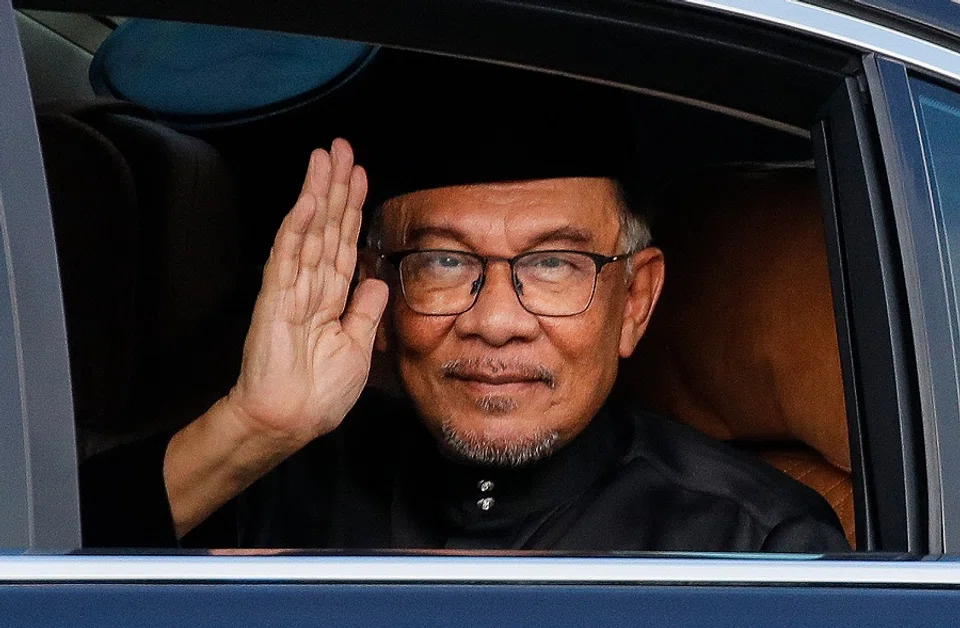Will Malaysia's Anwar adopt a 'pro-West' stance?
Malaysian researcher Liew Wui Chern explains why geographical dictates and long-held principles mean that Malaysia's foreign policy is unlikely to change drastically under Anwar, at least for now.

The dust has settled on Malaysia's 15th General Election. Although the election ended with a five-day hung parliament, the country eventually formed a "unity government" comprising the Pakatan Harapan, the Barisan Nasional and the Gabungan Parti Sarawak following the intervention of the Malay rulers.
Against this political backdrop, newly appointed Malaysian Prime Minister Anwar Ibrahim took nearly three weeks to form his leadership team (including full and deputy ministers). Although Malaysian public opinion had mixed reactions to this line-up forged from compromise, there is still much to look forward to as the team comprises former ministers and members of parliament who have performed well in the legislature or administration in the past.
But it is uncertain whether international society is worried or has expectations (like the Malaysians) of Anwar's new Cabinet. When Anwar was sworn in as Malaysia's prime minister, Malaysian commentators were quick to assess that Anwar's "pro-West" stance would mean closer alignment with the West, which could in turn damage Malaysia-China relations.
Such assessments made Western or pro-Western countries (such as Turkey) excited, as seen in the stream of congratulatory messages even before Anwar took his oath of office. But the problem with this view is that it omits considering the country's political undercurrents, especially the right-leaning opposition parties which earned the support of 54% of Malay voters.
... it is still too early to conclude that Anwar would lead a "pro-West" government.
Anwar not necessarily 'pro-West'
We need only look at Anwar's response to the media on 14 December after a Cabinet meeting. When asked whether electricity tariffs would be increased, Anwar replied that only export-oriented multinational corporations would be charged if tariffs were increased. This is a right-leaning protectionist policy rolled out by the left-leaning government to take into consideration the feelings of the Malay community. It runs counter to Anwar's belief in a free market when he was deputy prime minister and finance minister 25 years ago.
Hence, international society, whether China or the West, is paying close attention to Malaysia's future moves in foreign policy. Amid the current political situation and diplomatic environment, it is still too early to conclude that Anwar would lead a "pro-West" government.

Certainly, as most international relations academics are aware, it was only after Malaysia's second prime minister, Tun Abdul Razak Hussein, took office in 1970 that the country pursued a policy of neutrality and non-alignment. Before this, being pro-West has been Malaysia's established national policy.
Prior to that, apart from the fact that Malaysia's first prime minister, Tunku Abdul Rahman, had studied overseas, it was also because the country faced various military threats from the Malayan Communist Party (MCP), Indonesia, and the Philippines in the early stages of its establishment which forced the country to choose sides.
Even so, entering 1970, changes in the international environment including the MCP's diminishing threat, escalating Sino-Soviet tensions, and crowding in the Malacca Strait forced Tun Razak to adjust the existing diplomatic principles.
A year after taking office as prime minister, Tun Razak advanced the Zone of Peace, Freedom and Neutrality (ZOPFAN) in Southeast Asia and led the country to join the Non-Aligned Movement (NAM) in a bid to strengthen regional cooperation. In 1974, Malaysia established diplomatic relations with China. These actions solidified Malaysia's principle of non-alignment.
Within its own framework of neutrality and non-alliance, Malaysia took the "middle road" in Islam to check the rising Islamic terrorism of the time.

However, after Mahathir Mohamad became the Malaysian prime minister in the 1980s, his "Look East" policy, anti-Western rhetoric and focus on the country's national interest seemed to international relations academics to be pivoting away from the country's neutrality principle. Yet, these policies were in fact advanced under the framework of neutrality and non-alignment, just that the background and targets were different.
Neutrality between the Western world and third world countries
After the Cold War in the 1980s and 1990s and following the dissolution of the Soviet Union, it was an era of a US-dominated, unipolar world. The NAM that was meant to balance the Soviet Union and the US lost direction, and Malaysia had to shift from neutrality between the US and Soviet Union to neutrality between the Western world and third world countries, which is why Mahathir opposed the West and spoke up for third world countries.
By the millennium, the world was in an era of multipolar competition between the US, Russia, China and India. Within its own framework of neutrality and non-alliance, Malaysia took the "middle road" in Islam to check the rising Islamic terrorism of the time.

So, no matter how the background and environment of global politics change, the Malaysian government has not changed its diplomatic principles. Even when the left-leaning Pakatan Harapan took office in 2018, its diplomatic principles stayed on the same course. While it did become more conservative, such as cancelling the high-speed rail between Johor and Singapore, this was a consequence of internal politics, and had nothing to do with a change of diplomatic policies.
Of course, at this point, readers might wonder why Malaysia has stuck to diplomatic neutrality and non-alliance - in fact, this has to do with Malaysia's inherent geographical conditions.
... I can foresee that the new government will stick to the principle of neutrality and non-alliance.
Western Malaysia is next to the Malacca Strait, a key maritime route; on the east, it holds the Singapore Strait, known as the "throat" of the Malacca Strait, and one of the four busiest international maritime routes in the world. It is also one of the most important routes for the global transport of petrol, and it goes without saying how important it is.
With these geographical advantages, naturally, Malaysia can afford to stay neutral and without alliances, and even managed its hedging against the context of the China-US competition in the 2020s. Besides, in terms of international ethics, Malaysia also needs to balance the interests of various countries that use the route, so taking sides in its diplomatic policy would hurt certain parties.
Hope for high-speed rail to be restarted?
So, I can foresee that the new government will stick to the principle of neutrality and non-alliance. And when it comes to the Cabinet, having former Perak Chief Minister Zambry Abd Kadir - who has no federal administrative experience - as foreign minister, and relatively inexperienced former Deputy Minister for Education Mohamad Alamin as his deputy, also means there will be no major change in diplomatic policy direction.

Of course, the current international political climate is also very important. In the post-Covid era, the China-US tussle has escalated into opposition. The Western world is also gradually coming up with policies to contain China, while China's production has gone down due to China's long cycle of lockdowns and lifting, giving Anwar no reason to change diplomacy.
Anwar's diplomatic framework is probably the hedging model from Najib's time, which means staying friendly with China while maintaining stable relations with the West amid China-US opposition, so that neither side will misunderstand or take offence.
In addition, former Finance Minister Tengku Zafrul taking on the role of minister of international trade and industry also means that the new government will focus on promoting trade relations rather than traditional diplomatic relations. The signals might be good news for Singapore, because if previous joint projects that were halted, such as the high-speed rail, are helpful in promoting trade relations, it is a matter of time before they are restarted.
This article was first published in Lianhe Zaobao as "安华将延续马国"对冲"外交".





![[Photos] Fact versus fiction: The portrayal of WWII anti-Japanese martyrs in Taiwan](https://cassette.sphdigital.com.sg/image/thinkchina/3494f8bd481870f7c65b881fd21a3fd733f573f23232376e39c532a2c7593cbc)